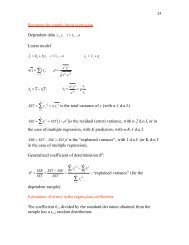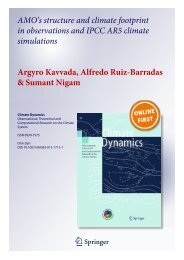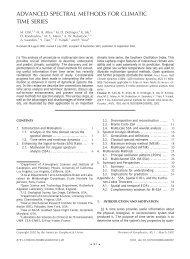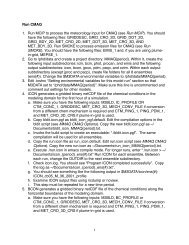chapter - Atmospheric and Oceanic Science
chapter - Atmospheric and Oceanic Science
chapter - Atmospheric and Oceanic Science
Create successful ePaper yourself
Turn your PDF publications into a flip-book with our unique Google optimized e-Paper software.
Interannual low frequency variability: Background<br />
Others studies have shown that the tropical Atlantic Ocean also plays an<br />
important role in the interannual variability of the rainy season of the Amazon <strong>and</strong><br />
Northeast region of Brazil (Hastenrath <strong>and</strong> Heller 1977; Moura <strong>and</strong> Shukla 1981;<br />
Servain 1991; Pulwarty, 1994; Nobre <strong>and</strong> Shukla 1996; Uvo et al. 1998; Souza et<br />
al. 2000 <strong>and</strong> others). However, for the Uruguay <strong>and</strong> southern Brazil, Diaz et al.<br />
(1998) show that both Pacific <strong>and</strong> Atlantic SST anomalies influence the rainfall<br />
regime in these regions during austral Spring <strong>and</strong> Summer, although during the fall-<br />
Winter period (April-July) only the SST anomalies in the southwestern Atlantic<br />
seem to have an influence on rainfall anomalies in this region.<br />
Much of the precipitation during the rainfall season in La Plata basin is produced<br />
by large mesoscale precipitation systems. Mesoscale Convective Processes<br />
(MCCs; Maddox 1980) are a subset of mesoscale precipitation systems characterized<br />
by their large size <strong>and</strong> longevity. The term MCC is an infrared satellite imagebased<br />
definition of cloudiness that was named by Maddox (1980) to classify the<br />
mesoscale systems that produce great rainfall amount over the North American<br />
Great Plains during spring <strong>and</strong> summer. Most MCCs occur over l<strong>and</strong> regions situated<br />
on the lee side of major topographic features <strong>and</strong> downstream from a low level<br />
jet that brings a continuous supply of warm-moist tropical air to feed the convection<br />
(Laing <strong>and</strong> Fritsch 1997; Velasco <strong>and</strong> Fritsch 1987). In that sense, La Plata<br />
basin is a favourable region for the occurrence of MCCs because it is located on the<br />
lee side of the Andes Mountains <strong>and</strong> downstream of the SALLJ, which supplies<br />
warm <strong>and</strong> moist air from the Amazon basin to feed the convection (Marengo et al,<br />
2004). Recently, Nieto Ferreira et al (2003) have presented an observational study<br />
of the January-March 1998-99 differences in precipitation, atmospheric circulation,<br />
<strong>and</strong> occurrence of large, long-lived convective cloud systems in South America.<br />
They chose this period because of the strongly contrasting Southern Oscillation<br />
conditions, where one of the strongest El Niño episodes on record was under way<br />
in the Pacific Ocean during JFM 1998 <strong>and</strong> a strong La Niña conditions prevailed in<br />
the Pacific Ocean during JFM 1999. They found that the SALLJ was about twice<br />
as strong during the warm ENSO phase than during the cold one. The stronger<br />
SALLJ was accompanied by large, long-lived convective cloud systems <strong>and</strong> nearly<br />
twice as much rainfall in subtropical South America (parts of southern Brazil,<br />
Uruguay, <strong>and</strong> Argentina).<br />
3.2. Variability over the La Plata basin<br />
Studies of precipitation variability have been hampered by the lack of an<br />
extensive observational network. Nevertheless, there are some results, mainly in<br />
connection with the El Niño Southern Oscillation (ENSO) that show that it has a<br />
considerable signal in the interannual variability of the precipitation over the La<br />
Plata basin (Aceituno 1988; Ropelewski <strong>and</strong> Halpert 1987, 1989; Kiladis <strong>and</strong> Diaz<br />
39






